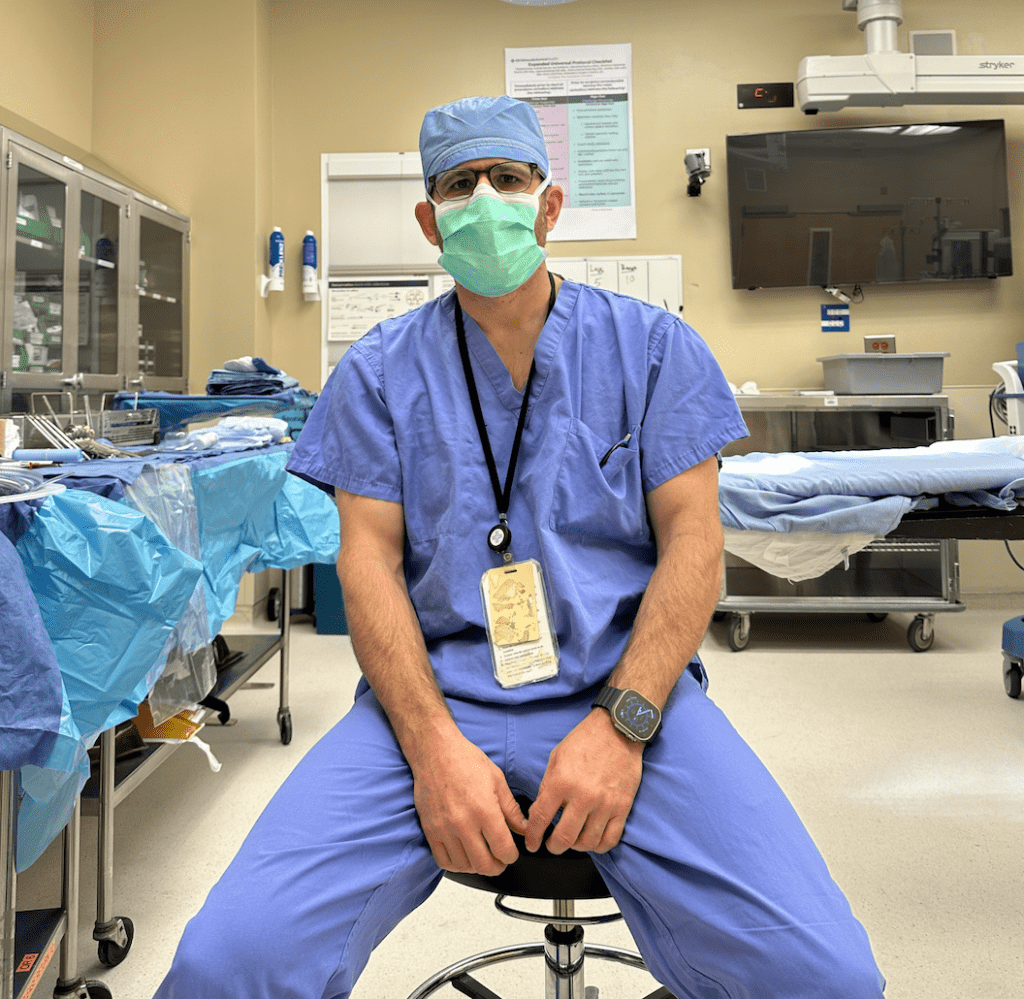Authored by Dr. Leland Jaffe, Associate Dean and Professor, Podiatric Foot and Ankle Surgeon; Published on March 7th, 2024
Many of my non-medical friends are surprised to find out that surgeons are often listening to music while operating. In the high-stakes world of surgery, where precision and focus are paramount, surgeons often find solace and focus through music. Non-medical individuals likely picture the operating room as a quiet setting, to allow the doctors, nurses, and staff to focus, and may be concerned about the distracting effect of music. In reality, this couldn’t be further from the truth!
A study that was conducted by Spotify and Figure1 documented that about 90% of surgeons listen to music in the OR while performing medical procedures, which can have a positive impact on the surgical case. While the sterile environment of the operating room may seem an unlikely place for personal expression, many surgeons curate carefully chosen playlists to accompany them. Let’s jump right into it and see what types of music different surgeons prefer in the operating room!
What Does Spotify Say About Surgeons’ Music Preferences?
In the scientific world, the data doesn’t lie…and in the music world, Spotify doesn’t lie either! In 2017 a survey was conducted by Spotify and Figure1 (A medical app used by many healthcare professionals) which included about 500 surgeons among others in the healthcare field. The study demonstrated that the following 10 songs are the most common songs played in the operating theatre in the United States.


- “Rock You Like a Hurricane”, Scorpions
- “Sweet Child O’ Mine”, Guns N’ Roses
- “Just What The Doctor Ordered”, Ted Nugent
- “Break On Through (To the Other Side)”, The Doors
- “Paint It Black”, The Rolling Stones
- “Whole Lotta Love”, Led Zeppelin
- “We Will Rock You”, Queen
- “Back in Black”, AC/DC
- “Cocaine”, Eric Clapton
- “The Wind Cries Mary”, Jimi Hendrix
This study also looked at the most popular genre of other surgical specialties which included:
- 1. Cardiac surgery — classical music
- 2. Otolaryngology-Head and Neck Surgery – Yacht rock and boy bands
- 3. Pediatric surgery – 80s, 90s, and current pop music
- 4. Surgical oncology – Alternative music for faster, less stressful cases, happy music for the last case of the day, total mix for routine cases, easier music for stressful cases
- 5. Plastic surgery – For easy/routine surgery – country, southern rock, and for more emergent trauma surgery, something like AC/DC, Metallica, or rap.
- 6. ENT – prefers input from the rest of the medical team
- 7. Ophthalmology – Classical/jazz music for difficult surgeries and pop music for minor procedures
- 8. Orthopedic surgery – alternative music or hip-hop
- 9. General surgery – rock classics, reggaeton, or reggae
- 10. Urology- rock, classical, and EDM
The Rhythm of Concentration:
Surgeons often gravitate towards instrumental music or genres with a steady rhythm to maintain focus and concentration. A prospective study that was published in 2010 analyzed 162 surgeons and concluded that music had an anxiolytic effect, reduced stress, and improved the overall performance of the surgery. Classical music, particularly pieces by composers like Mozart or Beethoven, is a popular choice for its soothing and structured nature. The absence of lyrics eliminates distractions, allowing surgeons to maintain focus throughout the surgical case.
Music in the operating room (OR) serves as more than just background noise—it plays a crucial role in enhancing the surgical environment and contributing to the efficiency of procedures. The rhythmic beats or soothing melodies can help alleviate stress and anxiety for both surgeons and patients, fostering a more relaxed atmosphere conducive to concentration and precision. Additionally, music can act as a natural way to mask disruptive sounds from medical equipment, potentially reducing distractions and promoting focus among surgical team members. Overall, integrating music into surgical routines can create a harmonious environment that promotes collaboration and improves the overall experience for everyone involved.
The rhythmic patterns and melodic structures of carefully chosen music can create a sense of order and cadence, helping surgeons synchronize their movements and maintain a steady pace. The calming effect of music has been shown to reduce stress and anxiety and lower the heart rate, which promotes a more composed and focused mindset in the operating room. By acting as a mental anchor, music becomes a tool that surgeons utilize to enhance concentration and elevate their performance.
Precision Through Music:
Some surgeons prefer genres with a consistent tempo to align with the rhythm of their work. Electronic music, ambient soundscapes, or even specific sub-genres of rock and pop with steady beats help create a sense of flow in the operating room. Surgeons find that a well-curated playlist can contribute to the precision required in delicate procedures.
Personalized Playlists:
Surgeons are individuals with diverse tastes, and their musical preferences in the operating room reflect this diversity. From classic rock anthems to contemporary pop hits, surgeons often create personalized playlists that resonate with their personalities and preferences. The familiarity of these tracks can provide a comforting backdrop during intense surgeries. Surgeons have also told me that their musical choice might also depend on the timing of the day.
Collaborative Playlists:
In some surgical teams, the choice of music becomes a collaborative effort. Surgeons, nurses, and anesthesiologists may contribute to creating a shared playlist, fostering a sense of teamwork and camaraderie. This collaborative approach ensures that everyone in the operating room feels comfortable and focused.
Patients: Do NOT worry!
Patients shouldn’t worry if their surgeon is listening to music during an operation, as this practice is often beneficial rather than detrimental to the procedure. Music in the operating room can help surgeons maintain focus and concentration, contributing to their overall performance and precision- as surgery requires our full attention. It can also serve as a stress reliever (lowering our blood pressure), helping surgeons stay calm and composed during complex procedures.
Moreover, listening to music can enhance the surgeon’s mood and well-being, which may ultimately translate into better patient outcomes and surgical performance. Importantly, surgeons are trained professionals who prioritize patient safety above all else, and their ability to multitask and remain attentive is not compromised by the presence of music. Therefore, patients can trust that their surgeon’s decision to listen to music is part of a routine that supports their ability to deliver high-quality care.
Are there any potential negative effects of listening to music while operating?
While music in the operating room can have numerous benefits, there are also potential negative effects to consider. One concern is that the music may distract or disrupt communication among members of the surgical team. Effective communication is crucial during surgery to ensure coordination and quick responses to any unexpected developments. Additionally, if the volume of the music is too loud, it could interfere with the ability to hear important sounds such as alarms or verbal cues from colleagues.
Furthermore, the choice of music may not always be suitable for all members of the surgical team, potentially causing discomfort or tension (for example a high-beat type of music might not be compatible with everyone’s taste). Lastly, there is a possibility that music preferences could vary among patients, and playing music that is not to their liking may lead to dissatisfaction or anxiety. Overall, while music can be a valuable tool in the operating room, it’s essential for surgical teams to carefully consider its potential negative effects and ensure that its use enhances rather than detracts from patient care. The OR should be a comfortable place for all involved, where everyone is focused and working in sync.
Music In The Operating Room – Conclusion:
The choice of music in the operating room is certainly a personal choice, but the positive effect of music cannot be denied. The effect of background music during a surgical procedure can create a sense of calmness and help maintain the pace of the surgery. Many of my non-medical friends are surprised to hear that in the surgical arena, we listen to music, and there’s not often a chaotic atmosphere during surgery. My personal music selections in the OR often include either 90’s rock or country music, and it certainly helps to lower my stress levels. I suppose that feeling of nostalgia helps to relax me as I’m hyperfocused on the surgical task at hand.
The influence of music played in the operating room (OR) on surgeon performance is a subject of ongoing debate and research. Music has been found to influence mood, concentration, and stress levels, which can ultimately affect a surgeon’s performance. Studies of moderate quality suggest that carefully selected music can enhance concentration, reduce stress, and improve overall performance by creating a more positive and focused atmosphere in the OR.
However, it is crucial to consider individual preferences and the type of surgery being performed, as different surgeons may respond differently to the presence of music. In contrast, excessive noise or inappropriate music choices might lead to distraction, hinder effective communication among the surgical team, and potentially compromise patient safety. Striking a balance between creating a conducive work environment and maintaining a sterile and professional atmosphere is essential to optimizing surgeon performance in the operating room.
Comment below on your preferred music in the operating room!







